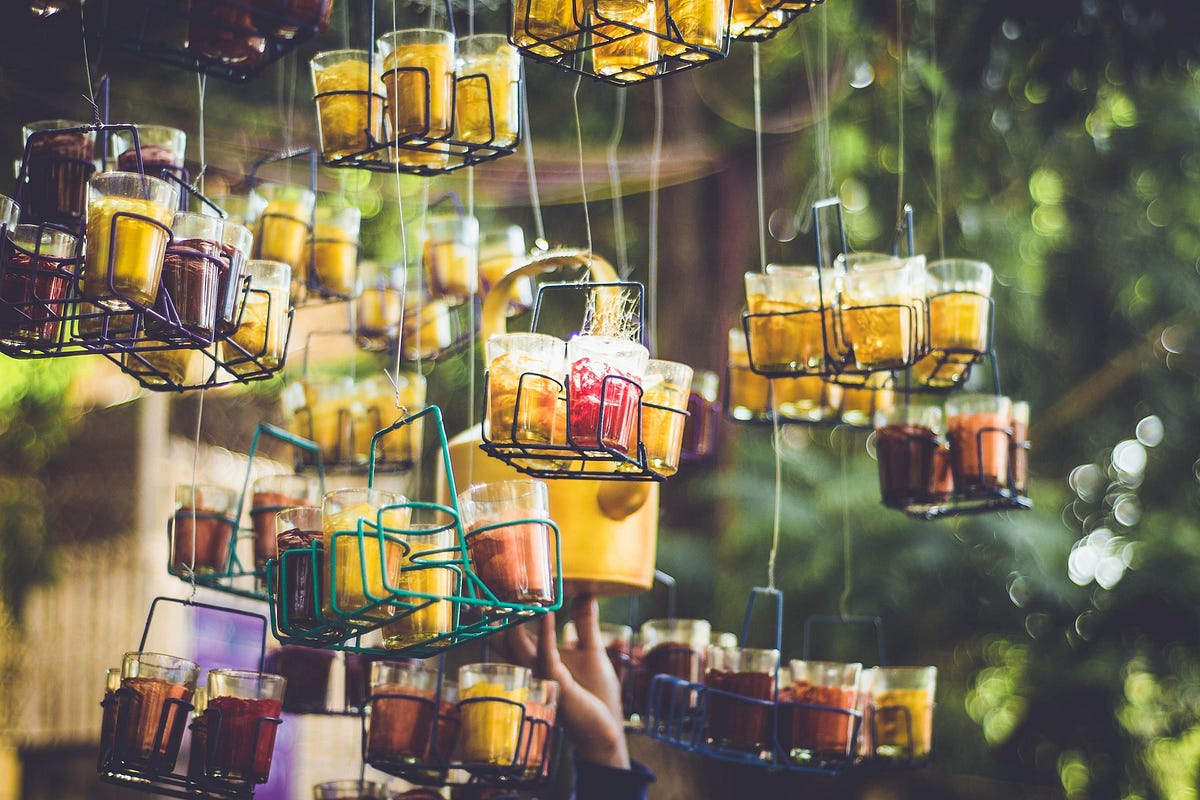Chai and Me
“I guess,” he said, “just don’t refrigerate?”
by Soniah Kamal
When I flew out to college in America from Pakistan in the early 90s, one of the first cravings to hit me as my parents waved their final goodbyes and left me alone in my small liberal arts campus was the craving for chai. An Urdu word, ‘chai’ literally means tea. In Pakistan, chai is tea leaves simmered into a golden-copper brew, sweetened with sugar and drunk with either a dash of milk or so much milk it turns the concoction into royalty. That’s what I craved as I cried myself to sleep that first night — a piping hot cup of sugary milky chai with the added touch of cardamom seeds floating like lilies on top.
I had not realized in Pakistan that tea was going to become my home away from home and so while I had packed henna powder to continue coloring my hair the fiery red it used to be once upon a time, packed chewing gum with cinnamon liquid insides to mask the smell of the Marlboro Lights I used to smoke back then, packed sugar-coated fennel and sachets of Rasily Supari, for an after-dinner dessert, I had not thought to pack tea.
The next day, the college arranged a trip to the grocery store. Walking up and down the wide cold aisles, I finally asked someone to point me in the direction of tea. My eyes rested on peppermint teas, Lemon Zingers, cherries and blueberries, on chamomiles, Sleepy Times, rooibos, plantation mints, dandelion, and orange pekoes. I frantically searched the multiple shelves — cinnamon spice tea, green teas galore, sugar plum tea, hibiscus tea but no tea-as-I-knew tea.
“I’m looking for just plain regular normal tea,” I earnestly explained to a befuddled shelver. “Unflavored tea to which I will add sugar and milk.”
The young man looked pained as he informed me that he himself was a coffee drinker and, after several minutes of staring at the teas as if he too was seeing them for the first time, handed me a box of iced tea.
“I guess,” he said, “just don’t refrigerate?”
I followed his directions. It did not taste good. It did not look good either, a weak watery brown that the addition of sugar and milk turned into an off-white sickeningly sweet something undrinkable.
It would not be until many months later when I flew to Kalamazoo Michigan where a friend was studying, and we drove down to Chicago and its famous Devon Street, a hub of South Asian restaurants and shops, that I would enter an Indo-Pak grocery store and finally come upon some plain old perfectly regular chai. That first sip was home, sheer giddy happy relief and I took a truckload of tea back to college.
Almost twenty years later, when Starbucks started selling something called chai-tea latte, how excited we South Asians were even as we collectively rolled our eyes at tea being named a redundant ‘chai tea’, i.e., tea-tea, and what in the world was coffee, latte, doing attached to tea-tea? Perhaps predictably enough, chai-tea latte turned out to be nothing like chai as we know it and for me it brought back my early days in America and my search for home in a cup.
Of course, since then I’ve learned that the normal black tea I was so hopelessly searching for is, in the U.S., called orange pekoe. It had been there, on the shelf, all along but I had not known, under a name I did not recognize. Since then I’ve also learned to appreciate a cold glass of sweet tea, after all I do live in the South, and my favorite American-style tea is an ice-filled Celestial Seasonings Country Peach Passion but even now when the craving for home hits the recipe is as old as time:
1) pour a cup’s worth of water into a saucepan
2) drop in a hefty table spoon of tea leaves
3) simmer till it bubbles golden-copper
4) add sugar and milk to taste
5) add 2 or 3 cardamom pods
6) drink in the heavenly scent
7) pour into cup, sip slowly, savor your chai, welcome to my home.
Soniah Kamal’s novel UnMarriageable: Jane Austen’s Pride & Prejudice in Pakistan is forthcoming from Random House USA (2018). Her debut novel An Isolated Incident was a finalist for the Townsend Award for Fiction, the KLF French Fiction Prize, and an Amazon Rising Star pick. Soniah’s TEDx talk, Redreaming Your Dream, is about regrets, second chances and redemption. Soniah’s short story ‘Fossils’, judged by Claudia Rankine, won the Agnes Scott 2017 Festival Award for Fiction. Her short story ‘Jelly Beans’ is selected for the 2017 Best of Asian Fiction Anthology. Her work has appeared in numerous publications including The New York Times, The Guardian, Catapult, The Missing Slate, BuzzFeed, Scroll.in, Literary Hub, and has been widely anthologized. Soniah was born in Pakistan, grew up in England and Saudi Arabia and currently resides in the U.S.




